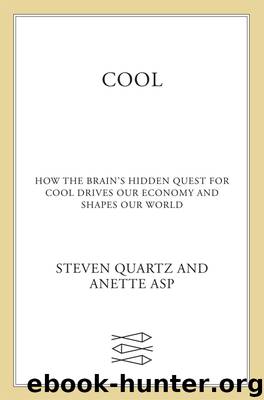Cool : How the Brain's Hidden Quest for Cool Drives Our Economy and Shapes Our World (9781429944182) by Quartz Steven; Asp Anette

Author:Quartz, Steven; Asp, Anette
Language: eng
Format: epub
ISBN: 9781429944182
Publisher: Macmillan
Divergence and Its Discontents
Although diversifying lifestyles is a potential way to confront the Status Dilemma, there are at least two main forces opposing it. First, adherents of existing lifestyles may resist diversifying lifestyles that clash with their cultural values. Second, elites will resist divergence when resources are scarce. We’ve already seen that social hierarchies tend to emerge as soon as scarce defensible resources appear. Social elites often devise cultural ideologies and institutions that are “extractive.”12 That is, they tend to amass wealth for the ruling class while subordinating others. According to the political scientists Ronald Inglehart and Wayne Baker, all known preindustrial societies have typically been low in levels of tolerance for diversity, and have restricted rights relating to abortion, divorce, homosexuality, and gender equality. All such societies were authoritarian.13 There are competing views on whether people came to accept the resulting social order. People rationalize their place in such societies, in part because making peace with the status quo makes their world feel less uncertain and less ambiguous.14 By using measures of social dominance orientation, the degree to which people oppose equality, we can see whether dominant and subordinate groups accept social hierarchy—does social hierarchy exist by consent, or do subordinates dissent from it? In a large analysis of more than one hundred studies that included participants from South America, North America, southern Africa, the Middle East, central Asia, East Asia, eastern and western Europe, and Britain, researchers found that members of subordinate groups strongly reject hierarchy.15 This rebellious discontent is particularly acute in societies that advocate norms of equality, suggesting that such norms heighten the resentment and sense of relative deprivation people feel when subordinated.
We’ve seen that one difference between chimpanzees and bonobos lies in the intensity of their status instinct, which reflects variations in the absolute wealth of their environments. Our greater behavioral flexibility depends in part on our ability to alter the intensity of these social instincts in response to changing environmental circumstances and norms. One of the most robust findings in the behavioral sciences is that changes in circumstances—and in our perception of them—have profound and predictable effects on the intensity of our status instinct. The intensity of within-group competition for resources can be predictably manipulated by altering the supply of a resource and its allocation.16 We already saw this with monogamous marriage, and how its inclusive norms and institutions reduced status competition. Consider also the unintended consequences of China’s one-child policy, which started around 1979. Beginning around 1988, China’s crime rate started to rise dramatically. By 2004, it had doubled. China’s one-child policy had unintentionally created a glut of millions of “surplus” men due to parents’ preference for boys. The short supply of potential wives intensified status competition for marriage and doubled the number of young, unmarried men.17 The link between low-status unmarried males and violent crimes is a constant theme across societies and time. Indeed, it’s confirmed daily in our headlines. We see how a scarce good or a narrow niche intensifies competition for more abstract forms of status as well.
Download
This site does not store any files on its server. We only index and link to content provided by other sites. Please contact the content providers to delete copyright contents if any and email us, we'll remove relevant links or contents immediately.
The Art of Thinking Clearly by Rolf Dobelli(8949)
Mindhunter: Inside the FBI's Elite Serial Crime Unit by John E. Douglas & Mark Olshaker(7925)
Change Your Questions, Change Your Life by Marilee Adams(6715)
Nudge - Improving Decisions about Health, Wealth, and Happiness by Thaler Sunstein(6696)
Mastermind: How to Think Like Sherlock Holmes by Maria Konnikova(6317)
The Power of Now: A Guide to Spiritual Enlightenment by Eckhart Tolle(4822)
Men In Love by Nancy Friday(4395)
Factfulness: Ten Reasons We're Wrong About the World – and Why Things Are Better Than You Think by Hans Rosling(4075)
The Confidence Code by Katty Kay(3631)
Thinking in Bets by Annie Duke(3586)
Man and His Symbols by Carl Gustav Jung(3374)
The Worm at the Core by Sheldon Solomon(2967)
Three Women by Lisa Taddeo(2947)
Why Buddhism is True by Robert Wright(2884)
Liar's Poker by Michael Lewis(2856)
The Inner Life of Animals by Peter Wohlleben(2801)
Descartes' Error by Antonio Damasio(2782)
The Power of Mindful Learning by Ellen J. Langer(2740)
The Slow Fix: Solve Problems, Work Smarter, and Live Better In a World Addicted to Speed by Carl Honore(2601)
